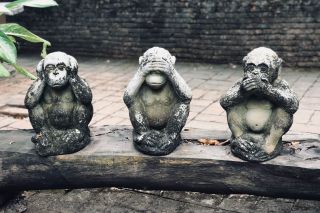Resilience
That Powerlessness You Feel Is Called "Moral Distress"
Cultivate moral resilience instead.
Posted January 24, 2023 Reviewed by Devon Frye
Key points
- Moral distress is the feeling that we've compromised ourselves due to external forces beyond our control.
- Powerlessness is at the heart of moral distress.
- Ongoing autonomic dysregulation can build up at an embodied level.
- Moral resilience shifts the narrative from powerlessness and helplessness to possibility and choice.

This is Part 1 in my series on moral distress and cultivating moral resilience. Read Part 2 here.
“See no evil, hear no evil, speak no evil” is a centuries-old proverb inspired by a Japanese carving that depicts three monkeys, each with a hand covering eyes, ears, and mouth, respectively. In the West, the phrase has come to be associated with turning a blind eye to something that is legally or morally wrong, but the original meaning was that a person should always avoid evil, including in deed.
But what do we do when we find ourselves in a situation where “evil” is unavoidable? When we can’t stop seeing or hearing it, or else are powerless to prevent it? What do we do when speaking up or acting against evil is inadvisable because doing so poses a direct threat to ourselves or to something or someone we love? What happens when life forces us to choose between two “wrongs,” or bad situations, either one compromising our core values, obligations, and commitments? How do these so-called “choices” live inside us? Better yet, how does “wrong” live inside us, whether it’s our own or something others have done?
The Concept of “Moral Distress”
“Moral distress” is a term coined in 1984 by philosopher Andrew Jameton to describe the suffering nurses experience when institutional or systemic barriers prevent them from acting with integrity, particularly when it comes to fundamental moral principles and ethical responsibilities. With the COVID-19 pandemic, the weight of moral distress on healthcare workers and first responders has been unprecedented.
But they are not alone. Both the widespread injurious effects of the pandemic on public health and the social, political, and economic unrest of the past few years have forced many people to confront morally distressing situations. At times, actions deemed to be ethical are different from the ones a person would naturally choose or reach for if otherwise available.
Powerlessness is at the heart of moral distress. It is the feeling that we have had to, or must seriously, compromise ourselves or something we hold dear due to external forces seemingly beyond our control. It is also the sense that others don’t grasp a moral significance or moral imperative that is clear to us. Moral distress is what results from repeatedly not having our values respected, either individually or collectively.
When we are morally distressed, we often feel muzzled, restricted, devalued, unheard, or dismissed. We easily become fueled by anger, disgust, fear, and frustration.
Over time, these emotions can fill us with anxiety, depletion, or depression. A sense of being fragmented can set in, leaving us to question who we or others are at their core and what the world is, generally. Research (Rushton, 2017) also shows that moral distress has long-term consequences, such as burnout, exhaustion, numbness, disconnection, and diminished moral sensitivity (also called “compassion fatigue”).
The damaging effects of moral distress aren’t limited to the affected actors. For instance, in health care, patients can also be negatively impacted, due to changes in a providers’ actions or attitudes toward care, similarly in law enforcement, social service settings, education, among others. In our day-to-day lives, this type of calcification can take a serious toll on beliefs, relationships, and affiliations. In its extreme form, it can result in “otherizing”—as we increasingly see on the political front.
How Moral Distress Lives Inside Us
Human beings are hardwired to detect and respond to threats. Like physical threats, psychological and existential or “soul” threats (like those to our integrity) can activate the body’s nervous system, shifting it from a calm, regulated state into survival mode. The most primitive part of the brain—the reptilian brain—goes on high alert, scouring the environment for other potential threats, and readying the body for action.
When this happens, a deluge of stress chemicals is released, which leads to physical, emotional, and cognitive changes. Our heart rate and blood pressure rise. Our muscles tighten. All nonessential functions become dormant.
Negative emotions are activated. Articulating and appropriately expressing feelings or desires can become difficult or exhausting. Our attention narrows and becomes biased toward potential threats. Our capacity for empathy lessens, which interferes with prosocial behavior, and we rely on instinctual defensive default patterns of thinking and behavior.
The way we inherently manage this stress response is, generally, in one of three ways: fight (trying to regain control by disarming the source of the threat and displaying power over it); flight (disengaging with the threat by quitting or, in cases of moral distress, placating the situation); and freeze (inaction or paralysis; numbing ourselves by “going through the motions”; as well as distraction, denial, or dissociation from the cause of the distress altogether).
Ongoing dysregulation, caused by repeated experiences of unprocessed moral distress, can build up at an embodied level—quite literally, in our tissues. In other words, it leaves “moral residue” or “ethical plaque” (also known as the “crescendo effect”) that lodges itself in our being, even after any one crisis is over. Like an occluded artery, this moral occlusion can threaten our very existence.
Cultivating Moral Resilience
Resilience is generally considered to be the ability to recover or adapt well to stress, adversity, or trauma; it ensures that change and challenge improve, rather than hurt our lives, and fortifies rather than weakens our spirit. Resilience helps us to see that difficulties need not leave us eternally damaged; only temporarily challenged.
Moral resilience, while still a nascent concept, is related to psychological resilience but distinct in three ways. Cynda Hylton Rushton, a leading scholar in the field of clinical ethics and a professor of nursing and pediatrics at the John Hopkins School of Nursing, says, “Moral resilience focuses on the moral aspects of human experience; the moral complexity of the decisions, obligations, and relationships; and the inevitable moral challenges that ignite conscience, confusion, and moral distress” (2016, p. 112). Because the moral domain is connected with all dimensions of human resources—biological, psychological, cognitive, spiritual, and relational—building moral resilience can benefit us at an embodied level.
Part two of the series, "How to Cultivate Moral Resilience," discusses the importance of cultivating moral resilience and provides practices for whenever you’re feeling boxed in by a morally distressing situation and struggling to hold onto your integrity.
References
Rushton, C. H. (2016). Moral resilience: A capacity for navigating moral distress in critical care. AACN Advanced Critical Care, 27(1), pp. 111-119. DOI: http://dx.doi.org/10.4037/aacnacc2016275
Rushton, C. H. (2017). Cultivating Moral Resilience. American Journal of Nursing, 117(2), p S11-S15. DOI: 10.1097/01.NAJ.0000512205.93596.00




